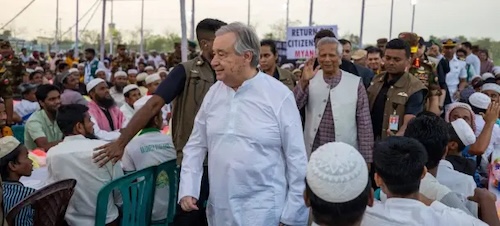By Jan Servaes
BANGKOK, Thailand | 22 March 2025 (IDN) — UN Secretary-General António Guterres visited Bangladesh from March 13 to 16. His visit came at a critical time as Bangladesh grapples with both internal and external challenges aimed at thwarting the historic reforms introduced by the interim government of Nobel Peace Prize winner Dr. Muhammad Yunus.
According to the Dhaka Tribune, these reforms are aimed at strengthening democracy, ensuring free and fair elections, rooting out corruption, ensuring the independence of the judiciary and depoliticizing public institutions, including both the civilian and military sectors.
Guterres held talks with senior government officials and visited refugees in Kutupalong in Cox’s Bazar district. With around 1 million mainly Rohingya refugees, Kutupalong is not only the largest camp in the world, it is also the most densely populated and has far exceeded its capacity. Most refugees have no access to clean water, sanitation or health care.
The largest exodus followed brutal attacks by the Tatmadaw, Myanmar’s military, in 2017, a series of events that the then UN High Commissioner for Human Rights, Zeid Ra’ad al-Hussein, described as “a textbook example of ethnic cleansing”.
“I had an extraordinarily moving visit to Cox’s Bazar yesterday. Ramadan reminds us of the universal values that unite humanity: compassion, empathy and generosity. Bangladesh is a living symbol of these values through your commitment to peace, development and humanitarian aid,” Guterres said.

“In offering refuge to Rohingya refugees, Bangladesh has demonstrated solidarity and human dignity, often at significant social, environmental and economic cost,” he continued.
However, the situation remains dire, with significant cuts to international humanitarian funding threatening to exacerbate the crisis, which he described as “an unmitigated disaster”.
“The escalation of violence and human rights violations across Myanmar, including Rakhine State, are causing civilian casualties and internal and external displacement,” Guterres said.
Disband of USAID
A few days earlier, the World Food Programme (WFP) had announced that monthly rations for refugees in Bangladesh would be halved, from USD 12.50 per person to just USD 6 per person. The WFP explained the reduction in rations as a result of an overall decline in international humanitarian funding.
But insiders explicitly refer to US President Donald Trump’s decision to suspend foreign aid disbursements for 90 days and to disband USAID. The lack of sufficient funding and the resulting reduction in aid provision are said to exacerbate security problems such as exploitation, human and drug trafficking, child labour, prostitution and domestic violence.
Cox’s Bazaar is also home to a number of militant groups, namely the Arakan Rohingya Army, the Arakan Rohingya Salvation Army and the Rohingya Solidarity Organization. These armed groups not only recruit in camps in Bangladesh, but are also involved in border fighting in Myanmar, particularly in Rakhine State. It emerged that Arakan Rohingya Salvation Army leader Ata Ullah was recently arrested along with five other members of the group on the outskirts of Dhaka on suspicion of involvement in “terrorist activities,” the Dhaka Tribune reported.
Guterres urged all parties in Myanmar to prioritize the protection of civilians, to prevent further violence and to pave the way for democracy, thereby creating the conditions for the dignified return of the Rohingya. Both the UN and Bangladesh aim to repatriate refugees to Myanmar on or before Eid al-Fitr in 2026.
Whether this is a feasible objective remains to be seen. Neither the current military junta nor the ousted NLDgovernment of Ang San Suu Kyi, consider the Rohingya Muslims to be ‘Burmese’. According to them, this only includes the Bamar population and Buddhists.
Specifically with regard to humanitarian needs in Myanmar and in particular Rakhine State, Guterres proposed establishing a humanitarian corridor between Rakhine State and Bangladesh, to facilitate the delivery of aid to communities in Myanmar and thereby also improve conditions in the country to enable later repatriation. To achieve this goal, Guterres put forward the United League of Arakan/Arakan Army (ULA/AA) as a necessary dialogue partner. Local commentators, however, expressed mixed opinions about Guterres’ emphasis on the ULA/AA.
Cautious transition
Bangladesh is currently still in a state of cautious transition, with the military carefully balancing national loyalty with international expectations. Since Bangladesh’s independence in 1971, its democratic system has been marked by illiberal practices, including the manipulation of minority issues for political influence. Under the leadership of former Prime Minister Sheikh Hasina, the Awami League (AL) has frequently exploited pro-Hindu sentiments to gain support from India, while failing to address the systemic problems facing minorities in Bangladesh.
Whether the balance holds or shifts under mounting global pressure will be a decisive factor in shaping the country’s future stability. The impact on and response of neighbouring countries, particularly Myanmar and China, will also need to be closely monitored.
*Jan Servaes (PhD) was UNESCO Chair in Communication for Sustainable Social Change. He has taught International Communication and Communication for Social Change in Australia, Belgium, China, Hong Kong, the United States, The Netherlands, and Thailand, in addition to several teaching stints at about 120 universities in 55 countries. [IDN-InDepthNews]
Image: UN Secretary-General António Guterres (right) speaks to the media in Dhaka alongside Md. Towhid Hossain, Foreign Adviser of Bangladesh. Credit: UN


